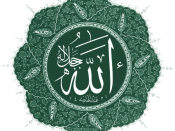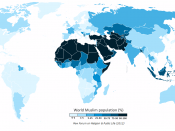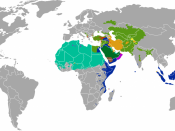In the 1940s and 1950s, the aspiration for an 'Islamic state' and constitutional recognition of Islamic law dominated Islamic politics. Yet in the post-Soeharto period, only a small minority of Muslims support these issues. How do you account for this change?
Introduction.
Ever since national independence in 1945, Muslim leaders and political parties in Indonesia have fought long and hard for the incorporation of Syariah (Islamic divine law) into the Indonesian Constitution. Movements were made to ensure that the state and the constitution reflect Islamic aspirations of the Muslim majority in Indonesia, sparking debates about whether or not the Jakarta Charter should be part of the Constitution. These political religious strives are part of 'perjuangan ideologi Islam di Indonesia,' with the aim being for 'negara ideal mengikut konsepsi Islam' (an ideal nation based on and operating in accordance with Islam). However, efforts to make Jakarta Charter part of the Constitution were persistently met with failure.
With the first democratic national election for the House of Representatives and Constitutional Assembly in 1955, debates over the state's ideological basis were only prolonged when the results showed an absence of a clear majority between secularists (PNI and PKI) and Islamists (Masyumi and Nadhlatul Ulama (NU)). The nation was divided between two political versions of Indonesia: PNI's Sukarno's Indonesia based on the Five Principles of Pancasila and Masyumi's Muhammad Natsir's Indonesia with Islam as the state's foundational principle.
When the Constitutional Assembly was dissolved by Sukarno in 1959, and Indonesia entered the period of Guided Democracy, Islamic parties were subjected to much control by the state and many were paralysed as a result. After Sukarno's fall in 1966, Islamic parties began to reorganise themselves but with Soeharto and the Indonesian Military coming into political power, they soon faced even stricter control and more hostile...


